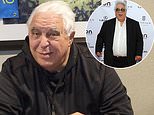It ain't THAT hot mum! Call this a heatwave? Not when you're BEN FOGLE and your trainers have melted in Death Valley, the burning Sahara's scarred your backside and you've woken in a steaming jungle covered in leeches
On Tuesday night, I dragged my mattress into the garden and slept in the open air.
The outdoor temperature in Oxfordshire was sweltering but inside my house it felt even hotter.
During the night, rain fell in a flash thunderstorm. I know that Britain has been divided as the heatwave broke, with some places flooded and others still dry as bone.
I got a taste of both. I didn’t mind the soaking. Mind you, it was handy that my wife Marina was away — she wouldn’t have been thrilled to see the mattress wet.
Getting a good night’s sleep by being damp is just one of the many tricks for staying cool that I’ve picked up during my global travels.
I needed them — and if you think this weather is unbearable, try to imagine what it’s like when you’re running through Death Valley in California.

Ben Fogle, pictured during the Marathon des Sables, shares experiences of extreme heat
During the hottest part of the day, in a heat-trap often cited as the cruellest in the world, I followed the runners in the Badwater race.
I wasn’t a competitor: places in this highly prestigious, 135-mile ultramarathon are seriously coveted and have to be earned.
I was following for a taste of the extreme conditions. It was so hot the soles of my trainers melted to the road and eventually separated from the rest of the shoes entirely.
One competitor dragged a coffin filled with iced water behind him — if you run out of water in this race, you’re going to die, so he reckoned he was covered both ways.
Though I never made the finish line, I did compete in the Marathon Des Sables which really tested my fortitude.
The 156-mile ultramarathon across the Sahara Desert is often described as the toughest foot race on Earth.
With average daytime temperatures peaking at 50c (122f), runners are also limited to the amount of water they can collect at designated points throughout the route.
So extreme is the race that many end up on intravenous drips to rehydrate their water-starved bodies.
I returned to the desert with my adventure buddy, the gold Olympic rowing champion James Cracknell, to cross the Empty Quarter in the south of the Arabian peninsula: 650 gruelling miles of desert — though this time we had camels with us.
The heat was suffocating. The broiling sand burned the soles of my feet as I attempted to walk barefoot and even scorched my nether regions when I sat on the sand.
I still have a scar. We were recreating the Bedouin journey in original kit, which meant wearing just a light cotton robe . . . with no boxer shorts.
To those who haven’t experienced this kind of heat, all I can say is it feels as though your eyeballs are melting in their sockets.

Ben Fogle in the desert as he crossed the Empty Quarter in the south of the Arabian peninsula: 650 gruelling miles of desert — with the help of some camels and his friend James Cracknell
During moments like that, I try to remind myself when I’ve endured even worse heat . . . and my mind always goes back to the jungle.
Jungle heat is the worst, because the 100 per cent humidity means you’re always soaked in sweat.
Your clothes chafe until every step is agony. The constant dampness in the feet can bring on trench foot.
At night, you can’t wait to strip off and lie on a sticky hammock, but bare skin brings its own dangers — as I discovered in Papua New Guinea, when I awoke with leeches all over my naked torso.
Even the leeches weren’t as bad as the sandflies of the Peruvian Amazon, which left my body infected by a flesh-eating parasite.
It took two courses of chemotherapy to get rid of that.
The most unexpected places can bring sweltering temperatures. When I climbed Everest, the inside of my tent during the day at Camp One rose to a balmy 32c (90f).
Heat was not what I expected in the high Himalayas 20,000ft above sea level.
When it became unbearable, I would step outside — where it was five degrees below freezing, and frostbite was the danger.
Several of my film crew were medically evacuated with heat exhaustion from my expedition to Mount Roraima in the Venezuelan jungle.
I have suffered from heat exhaustion twice, and I really wouldn’t recommend it.
The first time, I was 18 and on my gap year in Panama City, where I ended up in hospital on a drip.
I didn’t appreciate, like many Brits, that heat can kill you from stroke or exhaustion.
The second time was rowing across the Atlantic. Half way across the ocean, my body succumbed to the 40c heat and I passed out, vomiting . . . not that Cracknell was sympathetic. He told me to pull myself together and carry on rowing.
Without sufficient water, your body goes into spasm, major organs shutting down. That’s why dry desert heat can be so dangerous: you sweat, but it evaporates instantly, so you don’t realise how much water you are losing.
Ever since then, I’ve kept to a strict regime of drinking lots of water in all weathers, so much that my children sometimes call me ‘Dad the Camel’. I can down a two-litre bottle in one chug.
I’ve taught myself to endure heat — I need to, in my job, travelling to the most inhospitable places to film my series New Lives In The Wild, about people who have dropped out of the rat race to live far beyond the reach of civilisation.
In Kimberley, north-west Australia, I met a woman called Barbara Walker who lived on a farmstead 44 miles from the nearest town.

People enjoy the hot weather on Southsea beach in Hampshire. After days of scorching temperatures, large swathes of the UK could be hit by severe thunderstorms this week
Barbara was brought up in the fresh air of the Swiss Alps, but she left all that behind when she fell in love with an Aussie cattleman called Roy.
She never really did get used to the worst Australian desert heat, when summer temperatures hit 58c (137f). Who could? That’s almost twice as hot as this year’s British heatwave.
When I met Barbara, my film crew had to stop working for hours at a time, defeated by the heat.
The black casing of the cameras left blisters on the skin if you were foolish enough to pick one up — and eyepieces were hot enough to burn your face. Film kit began to melt.
At lunchtime, we cooked eggs on the bonnet of a Toyota LandCruiser. Then we sought out whatever shade there was, joining Barbara (who was 61) inside her house.
The fans didn’t cool the air, they just moved it around, so it was like sitting in a fan assisted oven.
Britain this week hasn’t been that bad. Barbara would probably wear her cardigan. But for the rest of us . . .phew, what a scorcher!
n Ben Fogle’s new book, Inspire: Life Lessons From The Wilderness is out on October 15, published by William Collins.
Most watched News videos
- Scottish woman has temper tantrum at Nashville airport
- Tesla Cybertruck explodes in front of Trump hotel in Las Vegas
- Mass panic as New Orleans attacker flies down Bourbon street
- Shocking moment zookeeper is fatally mauled by lions in private zoo
- Horrific video shows aftermath of New Orleans truck 'attack'
- Meghan Markle celebrates new year in first Instagram video
- Tesla Cybertruck burns outside Trump hotel in Las Vegas
- See how truck that drove into crowd made it through police barrier
- Cheerful Melania Trump bops to YMCA at Mar-a-Lago NYE bash
- New Orleans terror attack suspect reveals background in video
- Plane passenger throws drink at flight attendant in boozy fight
- Horrifying moment yacht crashes into rocks and sinks off Mexico coast






































































































































































































































































































































































